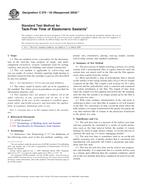Potřebujeme váš souhlas k využití jednotlivých dat, aby se vám mimo jiné mohly ukazovat informace týkající se vašich zájmů. Souhlas udělíte kliknutím na tlačítko „OK“.
ASTM C679-03(2009)e1
Standard Test Method for Tack-Free Time of Elastomeric Sealants (Includes all amendments And changes 9/3/2015).
Automaticky přeložený název:
Standardní zkušební metoda pro nelepivé Čas elastomerní tmelů
NORMA vydána dne 1.1.2009
Informace o normě:
Označení normy: ASTM C679-03(2009)e1
Poznámka: NEPLATNÁ
Datum vydání normy: 1.1.2009
Kód zboží: NS-14573
Počet stran: 3
Přibližná hmotnost: 9 g (0.02 liber)
Země: Americká technická norma
Kategorie: Technické normy ASTM
Anotace textu normy ASTM C679-03(2009)e1 :
Keywords:
sealants, tack, tack-free, Elastomeric seals/sealants, Sealants, Tack-free time, ICS Number Code 83.060 (Rubber), 91.100.50 (Binders. Sealing materials)
Doplňující informace
| Significance and Use | ||||
|
The tack-free time is a measure of the surface cure time and may generally be correlated to a variety of useful parameters such as the time interval before the sealant (1) resists damage by touch or light surface contact, (2) resists job-site or airborne dirt pick-up, (3) resists impinging rainfall. The tack-free time is sometimes used as an on-the-job quality assurance test. A quality product that is consistent and reproducible will generally fall within a maximum and minimum tack-free time. This test for tack-free time can be used at any temperature and humidity. It is important that if a sealant will be used in a climate quite different than the standard conditions called out in this test method, then those conditions be used to test the sealant. |
||||
| 1. Scope | ||||
|
1.1 This test method covers a procedure for the determination of the tack-free time property of single- and multi-component elastomeric sealants commonly used for sealing, caulking, and glazing in buildings and related construction. 1.2 This test method is applicable to self-leveling and non-sag grades of sealant. Sealants requiring slight heating to facilitate extrusion from the cartridge or gun are also described by this test method. Note 1—See Specification C 920 for type and grade definitions. 1.3 The values stated in metric units are to be regarded as the standard. The values given in parentheses are provided for information purposes only. 1.4 This standard does not purport to address all of the safety concerns, if any, associated with its use. It is the responsibility of the user of this standard to establish appropriate safety and health practices and determine the applicability of regulatory limitations prior to use. Note 2—Currently, there is no ISO standard similar to this specification. |
||||
| 2. Referenced Documents | ||||
|




 Cookies
Cookies
